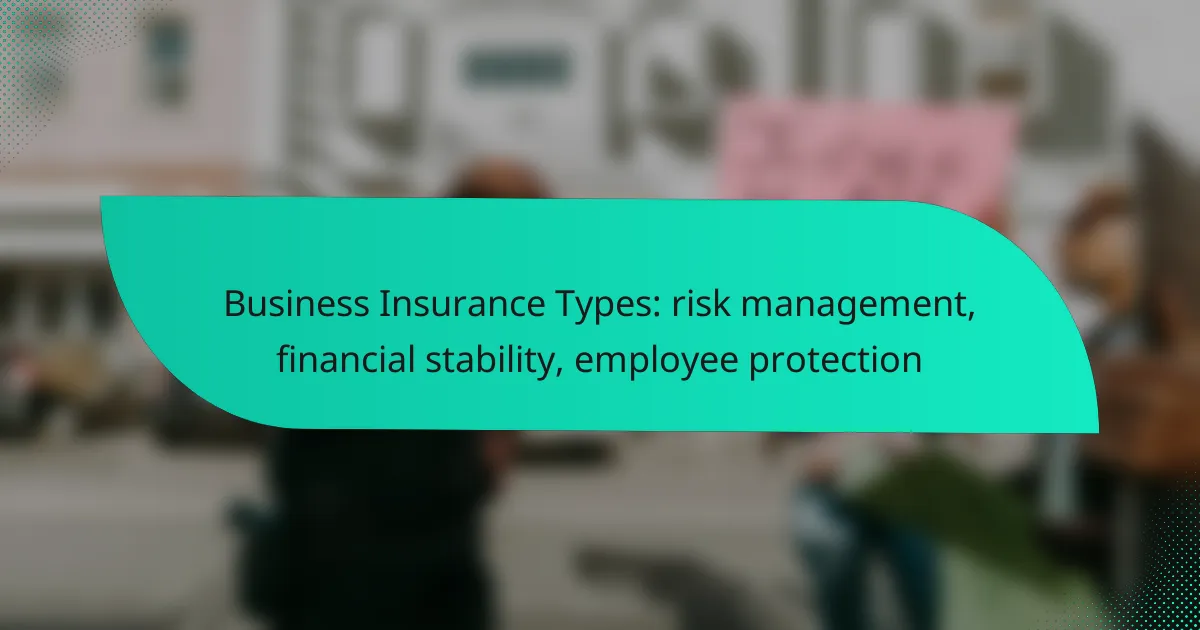Business insurance is vital for safeguarding companies against financial losses, legal liabilities, and employee-related risks. By understanding the various types of insurance available, businesses can effectively manage risks and maintain financial stability, ensuring smooth operations even in the face of unexpected challenges.

What are the key types of business insurance?
Business insurance encompasses various types designed to protect companies from financial losses, legal liabilities, and employee-related risks. Understanding these key types can help businesses manage risks effectively and ensure financial stability.
General Liability Insurance
General liability insurance protects businesses from claims related to bodily injury, property damage, and personal injury. This coverage is essential for safeguarding against lawsuits that can arise from accidents occurring on business premises or due to business operations.
Consider the potential costs of legal fees and settlements, which can easily reach thousands of dollars. Most businesses should carry at least $1 million in coverage to mitigate these risks effectively.
Property Insurance
Property insurance covers damage to a business’s physical assets, including buildings, equipment, and inventory. This type of insurance is crucial for protecting against losses from events like fire, theft, or natural disasters.
When selecting property insurance, assess the value of your assets and consider replacement costs. Policies can vary widely, so ensure you understand what is covered and any exclusions that may apply.
Workers’ Compensation Insurance
Workers’ compensation insurance provides coverage for employees who suffer work-related injuries or illnesses. This insurance helps cover medical expenses and lost wages, ensuring that employees receive necessary care without placing financial strain on the business.
Most states require businesses with employees to carry workers’ compensation insurance, with penalties for non-compliance. Rates depend on the industry and the number of employees, so it’s essential to shop around for competitive rates.
Professional Liability Insurance
Professional liability insurance, also known as errors and omissions insurance, protects businesses against claims of negligence or inadequate work. This coverage is particularly important for service-oriented industries where clients may seek compensation for perceived failures.
Evaluate the specific risks associated with your profession to determine the appropriate level of coverage. Policies typically range from $500,000 to several million dollars, depending on the nature of the services provided.
Business Interruption Insurance
Business interruption insurance helps cover lost income and ongoing expenses if a business is temporarily unable to operate due to a covered event, such as a natural disaster. This type of insurance is vital for maintaining cash flow during recovery periods.
When considering this insurance, assess potential revenue losses and fixed costs that would continue during a shutdown. Policies often cover a specific period, so ensure it aligns with your business’s recovery timeline.

How does business insurance support risk management?
Business insurance plays a crucial role in risk management by providing financial protection against unexpected events that could disrupt operations. It helps businesses mitigate potential losses, ensuring stability and continuity in the face of various risks.
Mitigates Financial Losses
Business insurance helps mitigate financial losses by covering expenses related to property damage, business interruption, and liability claims. For instance, if a fire damages a facility, property insurance can cover repair costs, reducing the financial burden on the business.
Companies should assess their specific risks and choose policies that align with their operational needs. Regularly reviewing coverage can ensure that businesses are adequately protected against evolving threats.
Protects Against Legal Claims
Insurance protects businesses against legal claims that may arise from accidents, injuries, or disputes. General liability insurance, for example, covers legal fees and settlements, which can be significant if a lawsuit occurs.
It’s essential for businesses to understand the types of legal claims they might face and ensure they have appropriate coverage. This not only safeguards finances but also enhances credibility with clients and partners.
Safeguards Assets
Business insurance safeguards assets by providing coverage for physical property, equipment, and inventory. In the event of theft, vandalism, or natural disasters, insurance can help replace or repair damaged assets, minimizing operational disruptions.
Businesses should conduct regular asset evaluations to determine the appropriate level of coverage needed. This proactive approach can prevent underinsurance and ensure that all critical assets are adequately protected.

What are the benefits of business insurance for financial stability?
Business insurance provides essential financial stability by protecting against unexpected losses, ensuring that operations can continue smoothly. It safeguards assets and helps manage risks, allowing businesses to thrive even in challenging circumstances.
Ensures Continuity of Operations
Business insurance plays a crucial role in maintaining continuity during disruptions, such as natural disasters or accidents. By covering repair costs and lost income, it allows businesses to resume operations quickly without significant financial strain.
For example, a small retail store affected by a fire can rely on property insurance to cover rebuilding costs and inventory losses, minimizing downtime and revenue loss.
Facilitates Access to Capital
Having business insurance can enhance a company’s ability to secure loans and attract investors. Lenders often require insurance as a condition for financing, viewing it as a risk management tool that protects their investment.
Businesses with comprehensive insurance coverage are perceived as lower-risk, which can lead to more favorable loan terms and interest rates, ultimately supporting growth and expansion.
Enhances Business Credibility
Insurance coverage boosts a business’s credibility with clients and partners, signaling professionalism and responsibility. Companies that are insured demonstrate their commitment to risk management, which can be a deciding factor for potential customers.
For instance, a contractor with liability insurance is more likely to win contracts than one without, as clients feel more secure knowing they are protected against potential mishaps during projects.

How does business insurance protect employees?
Business insurance protects employees by covering various risks associated with workplace injuries and financial instability. It ensures that employees receive necessary medical care and financial support, fostering a safer and more secure work environment.
Covers Medical Expenses
Business insurance typically includes coverage for medical expenses related to workplace injuries. This means that if an employee is injured on the job, their medical bills can be paid directly by the insurance provider, reducing the financial burden on both the employee and the employer.
Employers should ensure that their insurance policies meet local regulations regarding medical coverage. For example, in the United States, workers’ compensation insurance is often required to cover medical costs, while in Europe, similar protections exist under various national laws.
Provides Income Replacement
In the event of a workplace injury that prevents an employee from working, business insurance can provide income replacement benefits. This financial support helps employees maintain their standard of living while they recover, alleviating stress during a challenging time.
Income replacement typically covers a portion of the employee’s salary, often around two-thirds, for a specified duration. Employers should review their policies to understand the terms and ensure adequate coverage for their workforce.
Supports Employee Retention
Offering robust business insurance can enhance employee retention by demonstrating a commitment to their well-being. When employees feel secure in their jobs and confident that they will be supported in case of an injury, they are more likely to remain loyal to the company.
Employers can improve retention rates by clearly communicating the benefits of their insurance policies and ensuring that employees understand their rights and available support. Regular training sessions and informational resources can help reinforce this message.

What factors should businesses consider when choosing insurance?
Businesses should consider their specific risks, size, and industry when selecting insurance. Understanding these factors helps ensure adequate coverage and financial protection against potential losses.
Business Size and Type
The size and type of a business significantly influence its insurance needs. Small businesses may require basic coverage, while larger enterprises often need more comprehensive policies to address complex risks. For example, a tech startup might prioritize cyber liability insurance, while a manufacturing firm may focus on property and equipment coverage.
When assessing insurance options, consider the number of employees, revenue, and industry-specific risks. A small retail shop may benefit from general liability insurance, while a construction company should look into workers’ compensation and builder’s risk insurance. Tailoring coverage to fit the business profile is essential for effective risk management.
Industry-Specific Risks
Different industries face unique risks that should be considered when choosing insurance. For instance, healthcare providers may need malpractice insurance, while food service businesses should prioritize food safety and liability coverage. Understanding these industry-specific risks helps in selecting appropriate policies.
Researching common claims in your industry can provide insights into necessary coverage. For example, businesses in the hospitality sector might face higher risks of property damage and liability claims, necessitating robust insurance solutions. Consulting with an insurance broker familiar with your industry can also help identify critical coverage gaps.
Regulatory Requirements
Many businesses must comply with local regulations that dictate specific insurance requirements. For example, employers in the United States are generally required to carry workers’ compensation insurance, while certain industries may need additional coverage, such as professional liability or environmental insurance. Understanding these regulations is crucial for legal compliance and risk mitigation.
It’s advisable to stay informed about changes in regulations that may affect insurance needs. Regularly reviewing insurance policies and consulting with legal or insurance professionals can help ensure compliance and adequate protection against potential liabilities.
